- Home
- Andrzej Sapkowski
Season of Storms Page 7
Season of Storms Read online
Page 7
Geralt embraced her. As though she were all the world to him.
They didn’t get much sleep the first night. And even when Lytta dropped off, the Witcher found it difficult. Her arm was girdling his waist so tightly he found it hard to breathe and her leg was thrown across his thighs.
The second night she was less possessive. She didn’t hold him or hug him as tightly as before. By then she’d stopped fearing he’d run away before dawn.
“You’re pensive. You have a gloomy, male expression. The reason?”
“I’m wondering about the … hmm … naturalism of our relationship.”
“What do you mean?”
“As I said. Naturalism.”
“It seems you used the word ‘relationship’? The semantic capacity of that concept is indeed astonishing. Furthermore, I hear post-coital tristesse intruding on you. A natural state, indeed, it affects all the higher creatures. A strange little tear has come to my eye too, Witcher … Cheer up, cheer up. I’m joking.”
“You lured me … As a buck is lured.”
“What?”
“You lured me. Like an insect. With magical freesia-and-apricot pheromones.”
“Are you serious?”
“Don’t get cross. Please, Coral.”
“I’m not. Quite the opposite. On second thought, I have to admit you’re right. Yes, it’s naturalism in its purest form. Except it’s utterly the reverse. It was you who beguiled and seduced me. At first sight. You naturalistically and animalistically treated me to a male courtship display. You hopped, stamped and fluffed up your tail—”
“That’s not true.”
“—fluffed up your tail and flapped your wings like a blackcock. You crowed and clucked—”
“No, I didn’t.”
“Yes, you did.”
“Didn’t.”
“Did. Embrace me.”
“Coral?”
“What?”
“Lytta Neyd … That isn’t your real name, is it?”
“My real one was troublesome.”
“Why so?”
“Try saying quickly: Astrid Lyttneyd Ásgeirrfinnbjornsdottir.”
“I get it.”
“I doubt you do.”
“Coral?”
“Uh-huh?”
“And Mozaïk? Where did she get her nickname?”
“Know what I don’t like, Witcher? Questions about other women. And particularly when the enquirer is lying in bed with me. And asks a lot of questions, instead of concentrating on the matter in hand. You wouldn’t dare doing anything like that if you were in bed with Yennefer.”
“And I don’t like certain names being mentioned either. Especially when—”
“Shall I stop?”
“I didn’t say that.”
Coral kissed his arm.
“When she arrived at school her given name was Aïk. I don’t remember her family name. Not only did she have a strange name, but she suffered from loss of skin pigment. Her cheeks were dotted with pale spots, she indeed looked like a mosaic. She was cured, naturally, after the first semester, for a sorceress cannot have any blemishes. But the spiteful nickname stuck. And quickly stopped being spiteful. She grew to like it herself. But enough of her. Talk to me and about me. Go on, right now.”
“What, right now?”
“Talk about me. What I’m like. Beautiful, aren’t I? Go on, say it!”
“Beautiful. Red-haired. And freckled.”
“I’m not freckled. I magically removed them.”
“Not all. You forgot about some of them. But I found them.”
“Where are … Oh. Well, all right. True. So, I’m freckled. And what else am I?”
“Sweet.”
“I beg your pardon?”
“Sweet. As a honey wafer.”
“You aren’t making fun of me, are you?”
“Look at me. Into my eyes. Do you see even the slightest insincerity in them?”
“No. And that’s what worries me most.”
“Sit down on the edge of the bed.”
“Or else?”
“I want to get my own back.”
“I beg your pardon?”
“For the freckles you found where you found them. For your efforts and the thorough … exploration. I want to get my own back and repay you. May I?”
“By all means.”
The sorceress’s villa, like almost all the villas in that part of the city, had a terrace with a view of the sea stretching out below. Lytta liked to sit there and spend hours observing the ships riding at anchor, using a telescope of hefty proportions on a tripod. Geralt didn’t really share her fascination with the sea and what sailed on it, but liked to accompany her on the terrace. He sat close, right behind her, with his face beside her red curls, enjoying the scent of freesias and apricots.
“That galleon, casting its anchor, look—” Coral pointed “—with the blue cross on its flag. That’s the Pride of Cintra. It’s probably sailing to Kovir. And that cog is Alke from Cidaris, probably taking on a cargo of hides. And over there, that’s Tetyda, a hulk from here, four hundred tons’ capacity, a freighter, plying between Kerack and Nastróg. And there, see, the Novigradian schooner Pandora Parvi sailing to anchor right now. It’s a beautiful, beautiful ship. Look into the eyepiece. You’ll see it …”
“I can see without a telescope. I’m a mutant.”
“Oh, true. I’d forgotten. And over there is the galley Fuchsia, thirty-two oars, it can take a cargo of eight hundred tons. And that elegant three-mast galleon is Vertigo; it sailed from Lan Exeter. And there, in the distance, with the amaranth flag, is the Redanian galleon Albatross. Three masts, a hundred and twenty feet in the beam … There, look, look, the post clipper Echo is setting sail and putting out to sea. I know the captain, he eats at Ravenga’s when he anchors here. There again, look, a galleon from Poviss under full sail …”
The Witcher brushed Lytta’s hair from her back. Slowly, one by one, he unfastened the hooks and eyes and slid the dress from the sorceress’s shoulders. After that he utterly devoted his hands and attention to a pair of galleons under full sail. Galleons one would search for in vain on all the maritime routes, harbours, ports and registers of the admiralty.
Lytta didn’t protest. And didn’t take her eyes away from the telescope’s eyepiece.
“You’re behaving like a fifteen-year-old,” she said at one point. “As if you’ve never seen breasts before.”
“It’s always the first time for me,” he reluctantly confessed. “And I never really was fifteen.”
“I come from Skellige,” she told him later, in bed. “The sea’s in my blood. And I love it.”
“I dream of sailing away one day,” she continued, when he remained silent. “All alone. Set sail and put out to sea … Far, far away. All the way to the horizon. Only water and sky all around. The salt foam splashes me, the wind tugs my hair in an utterly male caress. And I’m alone, completely alone, endlessly alone among the strange and hostile elements. Solitude amid a sea of strangeness. Don’t you dream of that?”
No, I don’t, he thought. I have it every day.
The summer solstice arrived, and after it a magical night, the shortest of the year, when the flower of the fern bloomed in the forest and naked girls, rubbed with adder’s-tongue fern, danced in dew-sprinkled clearings.
A night as short as the blink of an eye.
A wild night, bright from lightning.
He awoke alone in the morning after the solstice. Breakfast was waiting for him in the kitchen. And not just breakfast.
“Good morning, Mozaïk. Beautiful weather, isn’t it? Where’s Lytta?”
“You have a day off,” she replied without looking at him. “My unparalleled mistress will be busy. Until late. During the time she devoted to … pleasure, the list of patients grew.”
“Patients?”
“She treats infertility. And other women’s disorders. Didn’t you know? Well, now you do. Good day.”
; “Don’t go out yet. I’d like to—”
“I don’t know what you’d like to do,” she interrupted. “But it’s probably a bad idea. It’d be better if you didn’t talk to me. Pretend I wasn’t here at all.”
“Coral won’t harm you any more, I give my word. In any case, she’s not here, she can’t see us.”
“She sees everything she wants to see; all she needs is a few spells and an artefact. And don’t kid yourself that you have any influence on her. That requires more than …” She nodded towards the bedroom. “Please, don’t mention my name in her presence. Not even casually. Because she won’t let me forget it. Even if it takes a year, she’ll remind me.”
“Since she treats you like that … can’t you simply go?”
“Go where?” she said crossly. “To a weaving manufactory? To serve time with a seamstress. Or head at once to a brothel? I don’t have anyone. I’m a nobody. And I’ll always be a nobody. Only she can change that. I can endure it all … But please don’t make it any worse.
“I met your pal in town.” She glanced at him a moment later. “That poet, Dandelion. He asked about you. He was anxious.”
“Did you calm him down? Explain I was safe? In no danger?”
“Why should I lie?”
“I beg your pardon?”
“You aren’t safe here. You’re here with her out of sorrow for the other one. Even when you’re close to her you only think about the other one. She knows it. But she plays along, because it pleases her, and you dissemble splendidly; you’re awfully convincing. Have you thought about what will happen when you give yourself away?”
“Are you staying with her tonight, too?”
“Yes,” Geralt confirmed.
“That’ll be a week, did you know?”
“Four days.”
Dandelion strummed the strings of his lute with a dramatic glissando. He looked around the tavern. He swigged from his mug and wiped the froth from his nose.
“I know it’s not my business,” he said, for him unusually emphatically and forcefully. “I know I shouldn’t meddle. I know you don’t like it when anyone meddles. But certain things, Geralt, my friend, ought not to be left unsaid. Coral, if you want to know my opinion, is one of those women who ought to always wear a conspicuous warning sign. One proclaiming ‘Look but don’t touch.’ In menageries, they put things like that in terrariums containing rattlesnakes.”
“I know.”
“She’s playing with you and toying with you.”
“I know.”
“You, meanwhile, are simply filling the void after Yennefer, whom you can’t forget about.”
“I know.”
“So why—?”
“I don’t know.”
They would go out in the evening. Sometimes to the park, sometimes to the hill overlooking the port. Sometimes they simply walked around the Spice Market.
They visited the Natura Rerum osteria together. Several times. Febus Ravenga was beside himself with joy. On his orders, the waiters danced attendance on them. Geralt finally experienced the taste of turbot in cuttlefish ink. And then goose legs in white wine and veal shank with vegetables. Only at first—and briefly—did the intrusive and ostentatious interest of the other guests bother him. Then he followed Lytta’s example and ignored them. The wine from the local cellar helped greatly.
Then they returned to the villa. Coral shed her dress in the anterooms and led him—quite naked—to the bedroom.
He followed her. His eyes never left her. He adored looking at her.
“Coral?”
“What?”
“Rumour has it you can always see what you want to see. All you need is a few spells and an artefact.”
“I think I’ll have to twist another of that rumour’s joints again.” She lifted herself up on an elbow and looked him in the eyes. “That ought to teach it not to gossip.”
“Please—”
“I was joking.” She cut him off. There wasn’t a trace of merriment in her voice.
“And what would you like to see?” she continued, after he had fallen silent, “Or have prophesied? How long you’re going to live? When and how you’ll die? What horse will win the Grand Tretorian? Who the electoral college will elect as the Hierarch of Novigrad? Who Yennefer is with now?”
“Lytta.”
“What’s bothering you, if I may ask?”
He told her about the theft of the swords.
There was a flash of lightning. And a moment later, a peal of thunder.
The fountain splashed very softly. The basin smelt of wet stone. The marble girl was petrified, wet and shining, in her dancing position.
“The statue and the fountain,” Coral hurried to explain, “aren’t there to satisfy my love for pretentious kitsch, nor are they an expression of subservience to snobbish fashions. They serve more concrete ends. The statue portrays me. In miniature. When I was fifteen.”
“Who would have supposed then that you would develop so prettily?”
“It’s a magical artefact powerfully linked to me. While the fountain, or more precisely the water, serves for divination. You know, I think, what divination is?”
“Vaguely.”
“The theft of your weapons took place around ten days ago. Oneiromancy is the best and most certain way of interpreting and analysing past events, even very distant ones, but the rare talent of dream-reading, which I don’t possess, is necessary for that. Sortilege, or cleromancy, won’t really help us; likewise, pyromancy and aeromancy, which are more effective in the case of foretelling people’s fates, on condition that one has something belonging to those people … hair, fingernails, a fragment of clothing or something similar. They can’t be used with objects—in our case, swords.
“And so all that remains to us is divination.” Lytta brushed a red lock from her forehead. “That, as you probably know, lets one see and predict future events. The elements will assist us, for a truly stormy season has set in. We shall combine divination with ceraunoscopy. Come closer. Grasp my hand and don’t release it. Lean over and look into the water, but don’t touch it under any circumstances. Concentrate. Think about your swords! Think hard about them!”
He heard her chanting a spell. The water in the basin reacted, foaming and rippling more powerfully with every sentence of the formula being uttered. Large bubbles began to rise from the bottom.
The water became smooth and cloudy. And then completely clear.
Dark, violet eyes look out from the depths. Raven-black locks fall onto shoulders in cascades, gleam, reflect light like a peacock’s feathers, writhing and rippling with every movement …
“The swords,” Coral reminded him, quietly and scathingly. “You were supposed to be thinking about the swords.”
The water swirled, the black-haired, violet-eyed woman disappeared in the vortex. Geralt sighed softly.
“Think about the swords,” hissed Lytta. “Not her!”
She chanted a spell in another flash of lightning. The statue in the fountain lit up milkily, and the water again calmed and became transparent. And then he saw.
His sword. Hands touching it. Rings on fingers.
… made from a meteorite. The superb balance, the weight of the blade precisely equal to the weight of the hilt …
The other sword. Silver. The same hands.
… a steel tang edged with silver … Runic characters along the entire length …
“I can see them,” he whispered aloud, squeezing Lytta’s hand. “I can see my swords … Really—”
“Quiet.” She responded with an even stronger grip. “Be quiet and concentrate.”
The swords vanish. Instead of them he sees a black forest. An expanse of stones. Rocks. One of the rocks is immense, towering, tall and slender … Carved into a bizarre shape by strong winds …
The water foamed briefly.
A grizzled man with noble features, in a black velvet jacket and a gold-brocaded waistcoat, both hands resting on a mahogany lectern. Lot
number ten, he declares loudly. An absolute curio, an exceptional find, two witcher swords …
A large, black cat turns around on the spot, trying hard with its paw to reach the medallion on a chain swinging above it. Enamel on the medallion’s golden oval, a blue dolphin naiant.
A river flows among trees, beneath a canopy of branches and boughs hanging over the water. A woman in a long, close-fitting dress stands motionless on one of the boughs.
The water foams briefly and almost immediately becomes calm again.
He saw a sea of grass: a boundless plain reaching to the horizon. He saw it from above, as though from a bird’s-eye view … Or from the top of a hill. A hill, down whose slopes descend a row of vague shapes. When they turned their heads, he saw unmoving faces, unseeing, dead eyes. They’re dead, he suddenly realised. It’s a cortège of the dead …
Lytta’s fingers squeezed his hand again. With the strength of pliers.
A flash of lightning. A sudden gust of wind tugged at their hair. The water in the basin churned up, seethed, surged with foam, rose in a wave as high as the wall. And tumbled straight down on them. They both leaped back from the fountain. Coral stumbled and he held her up. Thunder boomed.
The sorceress screamed a spell and waved an arm. Lights came on throughout the house.
The water in the basin, a moment earlier a seething maelstrom, was smooth, calm, only being moved by the languidly trickling stream of the fountain. Even though a moment earlier a veritable tidal wave had poured over them, there wasn’t a single drop of water to be seen.
Geralt breathed out heavily. And stood up.
“Right at the end …” he muttered, helping the sorceress to stand up. “That last image … The hill and that procession … of people … I didn’t recognise it … I’ve no idea what it could be …”

 something ends something begins sapkowski
something ends something begins sapkowski The Last Wish
The Last Wish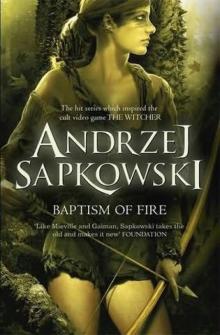 Baptism of Fire
Baptism of Fire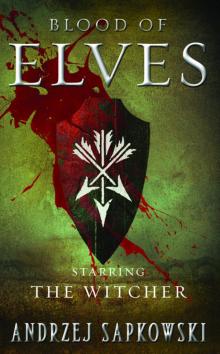 Blood of Elves
Blood of Elves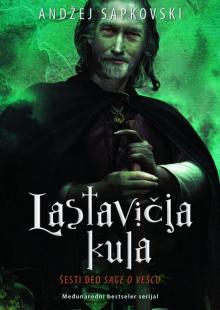 Lastavičja Kula
Lastavičja Kula Gospodarica Jezera
Gospodarica Jezera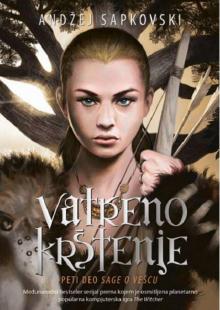 Vatreno Krštenje
Vatreno Krštenje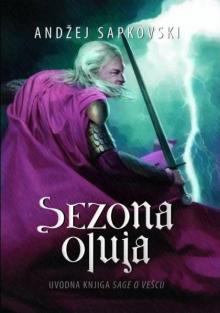 Sezona Oluja
Sezona Oluja Lady of the Lake
Lady of the Lake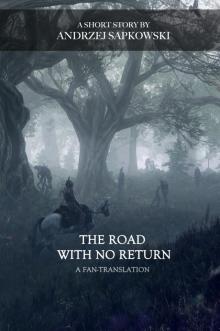 The Road With No Return
The Road With No Return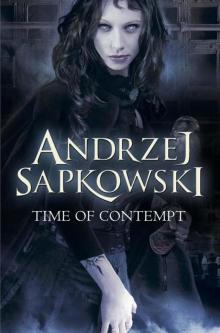 Time of Contempt
Time of Contempt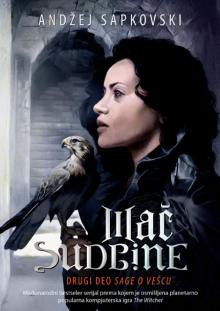 Mač Sudbine
Mač Sudbine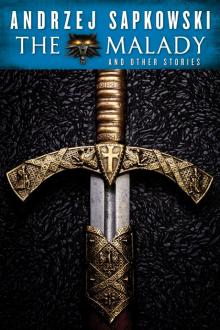 The Malady and Other Stories: An Andrzej Sapkowski Sampler
The Malady and Other Stories: An Andrzej Sapkowski Sampler The Saga of the Witcher
The Saga of the Witcher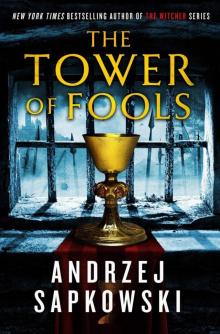 The Tower of Fools
The Tower of Fools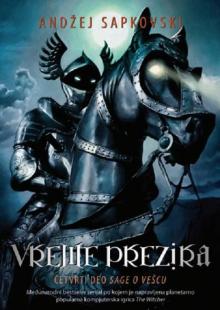 Vreme Prezira
Vreme Prezira Introducing the Witcher
Introducing the Witcher Stephen Hulin
Stephen Hulin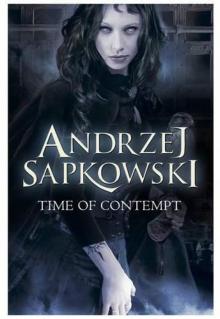 The Time of Contempt
The Time of Contempt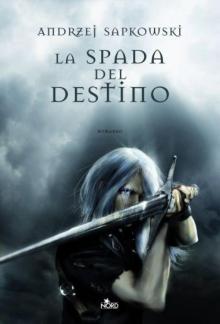 The Sword of Destiny
The Sword of Destiny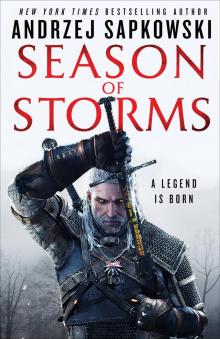 Season of Storms
Season of Storms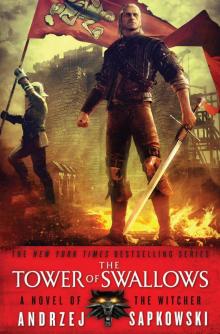 The Tower of Swallows
The Tower of Swallows The Last Wish: Introducing The Witcher
The Last Wish: Introducing The Witcher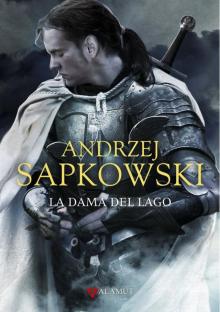 The Lady of the Lake
The Lady of the Lake